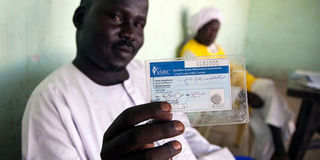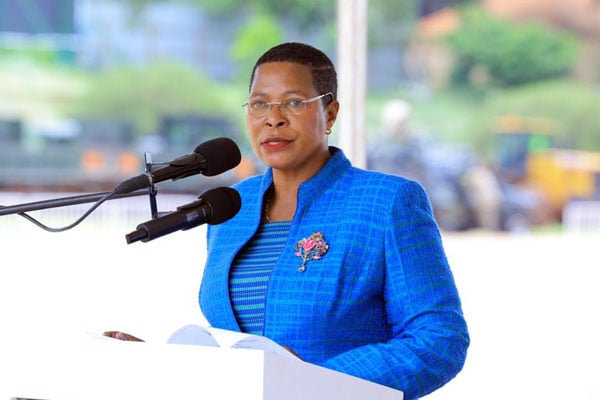SOUTH SUDAN REFERANDUM: Decision day for Sudan

MY POWER: A Sudanese national shows his ID and voter’s card.
Juba
Southern Sudan today goes to vote in a historic referendum to decide whether to split from the north, with the Chairman of the Southern Sudan Referendum Board, Justice Chan Reec Madut, declaring that they are “100 per cent” ready to conduct the exercise in which 3.9 million voters will cast their ballots.
“We have already distributed the registration kits and other materials. Exactly the 6th of January, we had finished the distribution to all the centres across Southern Sudan. We have altogether 2,638 centres in Southern Sudan and each centre now has its polling kits. We have also finished training for the polling officials in Southern Sudan. Today, we have nothing to do. We are just waiting for tomorrow. So we can say with all confidence that the preparations are 100 per cent, as I am speaking now, in the whole of Southern Sudan,” he said.
Addressing journalists at the Government of Southern Sudan Ministry of Information Headquarters, Justice Madut described the turn out for the registration exercise as “very, very huge.” The registration exercise ended today with the display of voters’ registers.
Big turn up expected
“The registration in the states of Southern Sudan stands at 3.7 million plus. In all the 15 states of Northern Sudan, we have registered 116,860. In the eight countries, they have registered 60,241. When you put all these together it is 3.9 million. Of these, the women represent 51 per cent in total. In Southern Sudan, the women have registered 52 per cent.
The January 9 referendum, which gives Southern Sudan the opportunity to choose whether to secede from the Arab-dominated north or remain united, is the final part of the Comprehensive Peace Agreement (CPA), which was signed in Kenya on January 9, 2005. The CPA ended 21 years of war between successive governments in Khartoum and the Sudan People’s Liberation Movement (SPLA), which resulted in the death of more than 2.5 million people.
Only Southern Sudan nationals are voting in an exercise which will be conducted in northern and southern Sudan, along with eight other countries, from January 9 – 15. The eight countries are Uganda, Kenya, Ethiopia, Egypt, Canada, United States of America and United Kingdom. As residents prepared to vote in Southern Sudan yesterday, the capital, Juba, was a beehive of activity as pro-secession groups made last-ditch efforts to mobilise people to go and vote.
Many cars were plastered with referendum posters, all of them calling for secession from the north. Referendum rules require Southern Sudan to garner at least 51 per cent of the total vote for the semi-autonomous region to be completely independent from the north.
Mr Madut said at least 60 per cent of the registered voters will have to cast their ballots for the exercise to be declared valid. “If they don’t raise 60 per cent, the referendum goes into a re-run,” he said. Before the voting exercise, fears had grown that war could resume between the north and the south, especially after the Khartoum-based Sudan Air Force was accused of dropping bombs in parts of the south around November.
The attack was interpreted as an attempt to provoke the south to retaliate and spark of a war that would have stopped the referendum vote from going ahead. However, a visit by Sudan President Omar al-Bashir to Juba a week before voting began has quelled fears. Mr Bashir promised that he would respect the results of the referendum.
The historic vote has drawn interest from around the world, with several international media houses ready to cover the event live. Mr Madut said there are more than 1,400 international observers from different parts of the world overseeing the exercise.
A representative for one of the observers, Neil McCann, who is the Deputy Chief Observer of the European Union’s Election Observation Mission for the Southern Sudan Referendum, said they will have 104 people in the country observing the process over the next week.
Mr McCann said they have been in Southern Sudan since early November. “We are looking at a lot of issues. We designed a series of questions, a check list that we will be asking our observers to look out for. For example, do voters appear to be aware exactly where they should vote? What are the consequences of the vote? Are they aware what is going to happen within the polling centres?
We will be observing the staff; the extent to which they are implementing the procedures according to what has been agreed by the Southern Sudan Referendum Commission. We will be looking at things like the overnight storage of materials; how safe are they given that this is a seven day operation and that a lot of the polling centres are outdoors,” he told Sunday Monitor in an interview yesterday.
Mr McCann said they do not anticipate any violence during the voting exercise. “We don’t like to anticipate what might not go right. Ultimately though we have been observing over the last number of weeks issues like the training of polling staff. We do think that is going to be a crucial element in implementing the referendum according to the procedures. Everybody accepts that this referendum has been done in a timeframe that is very tight so a lot of the activities happen one after the other,” he said.
The EU observer however said the exercise has faced a series of challenges and they will be closely monitoring whether such challenges will affect the ultimate exercise.
Comparing the registration exercise in Southern Sudan and the recent one in Kenya, he said: “The way voters have been registered in Southern Sudan for this referendum is quite different from the way voters are registered in other countries.
For example, for the referendum on the new constitution this year in Kenya, a system of optical mark recognition forms was used whereby voters’ data is entered onto sheets of paper that are then later scanned at a different location and an electronic register of voters is compiled. There was also the use of digital kits in Kenya in some constituencies.
“Here in Southern Sudan, simply the time was not available to be conducting a registration process that would require off-site scanning of forms and building an electronic register. So everybody’s name for this register was written into the handbook where they registered the day they registered and that book has not left that location since.
Different registration
So when we talk about the publication of the register today, in effect it really means that the book is on display and it is considered and declared to be the final register in advance of [today], taking into account any changes that might have happened in the last couple of weeks such as appeals that voters who were denied registration were taken to local competent courts who might have determined that they were eligible to vote and they will give them a certificate allowing them to vote, whicthey will then present to polling officials on polling day,” he added.
Doubts however surround the possibility of a similar voting exercise in the oil-rich region of Abyei, which was expected to hold a similar referendum today to decide whether they will belong to the north or the south. Failure by Abyei to hold its referendum simultaneously as the one in the south, as had been agreed in the CPA, could become another point of conflict between the north and the south.




